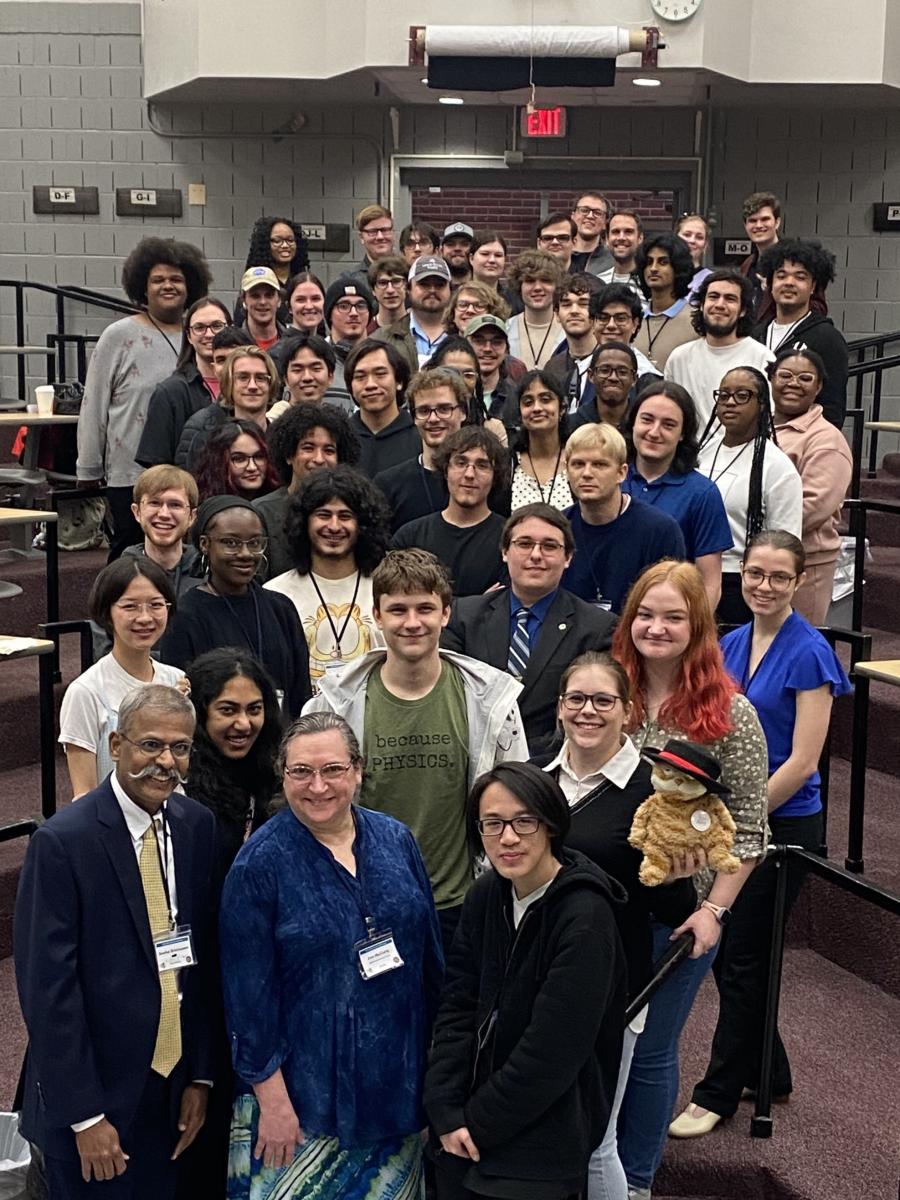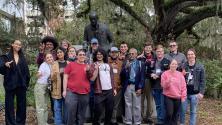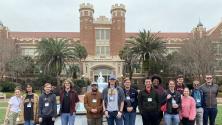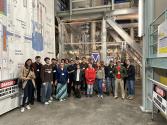SPS Zone Meeting
February 16, 2024 to February 18, 2024
Tallahassee, FL
Meeting host: By:Robert Laughlin
SPS Chapter:

SPS Zone 6 Meeting
Meeting Report:
From February 16th to 18th, the Florida State University chapter of the Society of Physics Students hosted the Spring 2024 Zone 6 Meeting (Agenda attached). The conference was held at the Keen Building and Richards Building where the FSU Physics Department is located. Over 60 Students from 11 chapters participated in the Zone 6 Meeting. Chapters from every state and territory in Zone 6 (AL, FL, GA) were represented at the conference, with the University of Puerto Rico, Río Piedras, joining remotely. The focus of the conference was the importance of community in physics.
The conference started on Friday with a board game social during the registration. Then, Robert Laughlin, the Associate Zone 6 Councilor, provided welcoming remarks and a talk that briefly discussed his journey in physics and then shifted to inform the attendees on the importance of community in the field. Afterwards, chapters were encouraged to connect with each other and exchange ideas during the “chapter showcase”. The night was capped off with a pizza party, with pizza from Momo’s pizza, a local pizza restaurant, and a “bad physics” movie watch party, where we watched Moonfall.
Early Saturday morning, attendees were treated to breakfast before hearing from the first round of guest speakers. First, Dr. Volker Crede, the graduate director at FSU, informed us about the opportunities at the graduate physics program at Florida State University. Then, Dr. Jamel Ali, an assistant professor at the FAMU-FSU College of Engineering, provided an interesting presentation on his research at the National High Magnetic Field Laboratory (MagLab) on micro/nano biorobotics. Following this talk, we held a workshop exploring the Physics Toolbox Sensor Suite, developed by Vieyra Software, who helped us organize the workshop. Attendees used supplies provided to complete challenges on the app, explore the sensors on their phones, and consider how this app could be used as a cheap but effective tool for outreach to engage k-12 students in physics. After this workshop, Dr. Randall Tagg, an associate professor from University of Colorado Denver, joined us remotely to provide a talk on how to use our physics degrees to positively impact our community, sharing multiple examples from his life and encouraging students to contribute by creating Physics Student Innovators (PSI* or ᴪ*) clubs at their universities.
Following these talks and workshops, students went to the Pat Thomas Planetarium at FSU to watch “Phantom of the Universe”, a show about the exploration of dark matter in our universe. Dr. Peter Hoeflich, the planetarium director, then answered audience questions to expand on the content of the show. After the planetarium showcase, attendees gathered to watch physics demonstrations prepared by Mark Cartagine and run by the local organizing committee. These demos included kinematic demos, a Faraday rotation demo, a radiation scintillator, and a cloud chamber. After this event packed morning, we had lunch and socialized.
In the evening, we had a poster session allowing attendees to share their research and encourage others to get involved in research at their university or through REUs. We had five research presentations from three different chapters. A couple of students presented their research as powerpoint presentations. After the poster session, we split the attendees into two groups to tour the MagLab and the John D. Fox Superconducting Linear Accelerator Laboratory. During the John D. Fox Lab tour, students got to see the Linear accelerator and learn about the nuclear physics research at FSU. During the MagLab tour, students had the chance to learn how the magnets are made and operated, the various research projects performed at the facility, and see the world’s strongest magnet. After the MagLab tour, Dr. Jamel Ali gave attendees a tour of his lab at the MagLab. After these tours we gathered back at Keen Building to socialize and have baked Ziti prepared by the local organizing committee.
After dinner, we started our evening speaker session. Dr. Anthony Kuchera, the Zone 5 Councilor and FSU alumni, gave a wonderful talk about his research journey, from his early interest in music to his career as an Associate Professor at Davidson College. Following his talk, Dr. Carol Scarllet, an associate professor at Florida A&M University (FAMU), gave a presentation on her research on axions and how they are a candidate for dark matter. After her talk, many students stayed to ask her many questions about dark matter and her research. Following this event packed day, our attendees dispersed for the evening.
The next morning, we shared another early morning breakfast before Dr. Sesha Srinivasan, the Zone 6 Councilor and APS CM Fellow, provided a talk on career opportunities in physics with many examples and statistics for students planning on pursuing a bachelor's degree, master’s degree, or a Phd. After his talk, the executive officers of the FSU Chapter and the FSU chapter advisor, Dr. Cyprian Lewandowski, were thanked for their help with the Zone 6 Conference and provided with an SPS drawstring bag as thanks for their work. After closing remarks, we took the attendees on a tour of FSUs campus to take a picture in front of Westcott Fountain and the statue of Paul Dirac located at the Paul Dirac Science Library. We then said goodbye to all of our friends made during the conference drawing the meeting to a close.
The Spring 2024 Zone 6 Meeting was a fun and event-packed meeting. The meeting allowed us to socialize and make connections with members from across the zone and discuss future collaborations between chapters outside of the Zone Meetings. Attendees really enjoyed the lab tours, guest speakers, planetarium show, and physics demos. The Spring 2024 Zone 6 Meeting provided attendees with ideas to bring back to their chapters to help them continue to grow and helped form strong bonds across Zone 6!
List of Attending Universities:
Florida State University (Host)
Davidson College (Zone 5) Florida A&M University
Florida International University
Florida Polytechnic University
University of Central Florida
University of Florida
University of North Alabama
University of Puerto Rico, Río Piedras (Remotely) Valdosta State University
Georgia State University Wallace Community College
Recommendation For Future Meetings:
The Zone 6 Conference attracted a lot of attendees. While this level of engagement is fantastic, gathering promotional material and managing event space can become challenging. In addition, many attendees registered the week of the conference, making it difficult to finalize catering for the event. In the future, it would be a good idea to set a registration deadline a week or two before the conference to make logistics run smoother.
Additionally, providing more breaks and time to socialize is much appreciated, and with such an event packed schedule that can be hard to do. Either spreading the conference out more over the three days or having fewer events would help provide more down time for attendees to socialize during.
A plan for catering and workshop materials should be completed in the prior fall semester. During fall an agreement should be made that outlines a tentative per attendee cost of all materials/food. There shall also be a clearly outlined interval of time in which chapters can request funds to support their travel to the event. This agreement should also allocate some money to be “reserves” in case things are more expensive than planned for, and it should be clear where leftover funds will be directed to.




